|
We are now looking forward to new opportunities and developments in 2008 having completed an incredibly full twelve months just past. The year has included prestigious achievements, high-profile events, high-impact publications and engaging new projects. As Director, it has been something of a whirlwind, completing the Dealing with Data Report in June and following this with much European and trans-Atlantic travel, culminating in presenting on "Open repositories for open science" at the CNI Taskforce meeting, and hosting the 3rd International DCC Conference, both taking place in Washington DC in December 2007. Finally we bade farewell to Rachel Heery, Deputy Director, much-appreciated colleague and friend; a résumé of her rich and successful career follows.
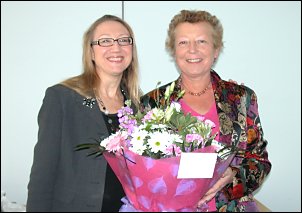
Rachel Heery, UKOLN's Assistant Director for Research and Development retired in October.
Rachel joined UKOLN as a Research Officer in August 1995 from SLS (Information Systems) Ltd, where she was Product Manager for the SLS Database Service. The mid-1990s was a time of rapid expansion for UKOLN, with the emergence of project-based funding opportunities through the JISC.s Electronic Libraries Programme (eLib) and the European Union.s research framework programmes. Rachel joined UKOLN to work on the eLib-funded ROADS (Resource Organisation And Discovery in Subject-based services), the first of many UKOLN projects that related to metadata, resource discovery and semantic interoperability. ROADS was very quickly augmented by two European Union-funded projects that covered broadly the same topics, so UKOLN began to expand and restructure to accommodate a growing research and development team. In due course, Rachel became the leader (later Assistant Director) of UKOLN's research and development team, and for over a decade was highly successful in not only obtaining additional research income but in matching staff effort to an ever-changing portfolio of research projects. The strength and breadth of UKOLN's research and development work today is a testament to Rachel's success in leading the team over the years.
Through research collaboration and through involvement in the emerging Dublin Core Metadata Initiative (DCMI), Rachel soon built up an international network of friends and colleagues. Rachel was heavily involved in DCMI development from a very early stage, and was a member of the Advisory Board and co-chair of the Dublin Core Registry Working Group for many years. She was a member of the programme committees of various conferences, most notably Programme Chair of the 8th European Conference on Digital Libraries (ECDL), which was held in Bath in September 2004.
Rachel's interest in metadata was primarily practical, focused on an honest appraisal of how it could (and would) be used in real world situations. Over time, Rachel developed a special interest in metadata schema registries, and helped lead several research projects that investigated their development and potential deployment, most notably the European Union-funded SCHEMAS Forum and CORES projects and the ongoing JISC Information Environment Metadata Schema Registry (IEMSR) activity. Here, her work relating to Application Profiles has been particularly influential in the digital libraries arena. More recently, she has been involved in various initiatives related to repository development and deployment, being a member of the programme advisory board for JISC's FAIR (Focus on Access to Institutional Resources) Programme and of the JISC Repositories and Preservation Advisory Group. In support of JISC's emerging Digital Repositories Programme, Rachel and Sheila Anderson of the Arts and Humanities Data Service produced a review of digital repository activities in 2005. This was followed up more recently with a forward-looking Digital Repositories Roadmap report, jointly written with Andy Powell of the Eduserv Foundation (a former UKOLN colleague). UKOLN's involvement in the repositories area continues through the activities of the Repositories Research Team and Repository Support Project.
Notwithstanding her many achievements in the wider world, we at UKOLN valued Rachel most as a trusted colleague and friend. As both team leader and colleague, we appreciated her personal kindness, honesty, resolve and attention to detail. We also admired the energy that she used to juggle the large number of projects for which she was responsible. We have much to learn from her example and wish her well in her retirement.
Further Information:
Rachel Heery
http://www.ukoln.ac.uk/ukoln/staff/r.heery/
Brian Kelly, Head of UKOLN’s Policy and Advice Team, has been awarded Information Professional of the Year by Information World Review for his work as UK Web Focus. Information World Review, in association with the American Psychological Association which sponsors the award, offers the prize to the information professional it considers to be in the forefront of pushing the boundaries of information and technology. The Review, arguably Europe's leading newspaper for the information industry, covering both content and information management issues, composes its judging panel from previous Award winners and its own editorial team.
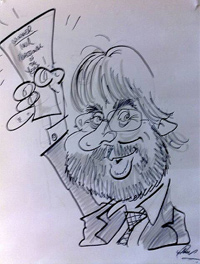
Mark Chillingworth, Editor of the IWR, commented of Brian, “I know from information professionals I have dealt with in the academic sector that he is very well respected and his thoughts are often the basis for great debate within the industry.” In considering his work, Mark added, “Brian is looking at the web as a central resource for learning and research in higher education and is looking at ways to make the web a successful resource, which is a challenging role, because the web is still very young and is constantly changing. This can be seen with the recent changes dubbed Web 2.0, therefore Brian is going to be pretty busy for some time to come.” Brian’s role as UK Web Focus addresses some of the issues the rapid development of the Web poses for UK Universities, FE colleges and service providers. The Web Focus provides awareness, coordination and advisory services using a variety of approaches. Its overall mission is to help maximise the effectiveness of the UK HE and FE community's investment in Web technologies. The post is funded by the JISC and the Museums Libraries and Archives Council (MLA). This national Web coordination and advisory work is based at UKOLN, University of Bath and has been carried out by Brian Kelly since its inception in November 1996. On presenting the award Timothy Rinda of the American Psychological Association said that it gave him pleasure “to announce a winner who in his working life, lives to push the boundaries of information and has been involved in researching WiFi, Skype, podcasts and video streaming as information delivery methods. He is also author of one of the most popular blogs in the sector.”
Further Information:
Information World Review source
http://blog.iwr.co.uk/2007/12/iwr-information.html
UK Web Focus: Reflections on the Web
http://ukwebfocus.wordpress.com/
JISC
http://www.jisc.ac.uk/
MLA
http://www.mla.gov.uk/
In February 2007, UKOLN and the Department of Mechanical Engineering at the University of Bath jointly hosted a workshop on the long-term retention of engineering knowledge and information. Participants were drawn from industry and academia on both sides of the Atlantic, and from both the engineering and digital curation communities. The debate focused on the theoretical and practical suitability of standards such as ISO 10303 for keeping information usable, and identified key technical, organisational and political obstacles that needed to be overcome. Participants agreed that several areas require immediate attention: techniques for bringing together and abstracting from information stored in numerous silos; compelling use cases that demonstrate the financial benefits of curating engineering information; illustrations of what is currently possible (and impossible); and risk management to budget for information loss. As a result of the workshop, participants gained a clearer understanding of the thorny issues surrounding long-term knowledge retention, and many opportunities for collaborative working were identified and taken.
Further Information:
AWLTKR Event Web site
http://www.ukoln.ac.uk/events/ltkr-2007/
As part of UKOLN's work to provide support and awareness to the MLA Partnership, a series of events is being planned to take place during the first half of 2008. Initial visits to each of the regional agencies are currently being carried out to identify the focus and type of event most relevant to the needs of each specific region. Topics identified so far include a blue skies strategy meeting, general presentations on current work at UKOLN, and single topic workshops on: social networking tools as a means to engage with non-standard audiences; using new ICT tools such as wikis and blogs to improve business practices; and standards and practice in digital preservation.
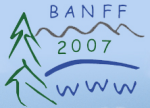
A paper entitled Accessibility 2.0: People, Policies and Processes
was presented the W4A (World Wide Web Workshop on Accessibility) 2007 event
held during the WWW 2007 conference, in Banff, Canada in May. This paper built
on previous work, led initially by UKOLN and TechDis, which has addressed limitations
in the WAI approach to Web accessibility. The current paper, which was informed
by discussions at the Accessibility Summit II meeting in November 2006, argued
that an emphasis on technical solutions (such as Semantic Web or Web 2.0 technologies)
to Web accessibility could be counter-productive. The paper called for a user-focused
approach to addressing accessibility issues and coined the term 'Accessibility
2.0' to describe an approach which builds on the successes of WAI's initial
model but which also addresses the limitations of WAI's approach which have
become apparent since its original guidelines were released in 1999.
Further Information:
16th International World Wide Web Conference (WWW2007)
http://www2007.org/
Access to the paper and accompanying slides is available from:
http://www.ukoln.ac.uk/web-focus/papers/w4a-2007/
UKOLN has been active in engaging with the museum community for a number of years, and this is an area in which we are seeking to do more. So Brian Kelly was pleased to be a member of the programme committee of Museums and the Web (MW) for 2007 and 2008. Brian was a co-author of two papers at MW 2007: Addressing the Limitations of Open Standards (jointly with Marieke Guy, UKOLN and Alastair Dunning, AHDS) and Web 2.0: How to Stop Thinking and Start Doing: Addressing Organisational Barriers (with Mike Ellis, Science Museum). In addition to these two papers, Brian also co-facilitated a Professional Forum on: Accessibility 2.0: A Holistic and User-centred Approach to Web Accessibility. The conference provided a valuable opportunity to engage with the museums sector and to describe UKOLN's work in the areas of standards, Web 2.0 and accessibility.
Further Information:
Access to the papers and accompanying slides is available from:
http://www.ukoln.ac.uk/web-focus/papers/mw-2007/
Museums and the Web 2007
http://www.archimuse.com/mw2007/
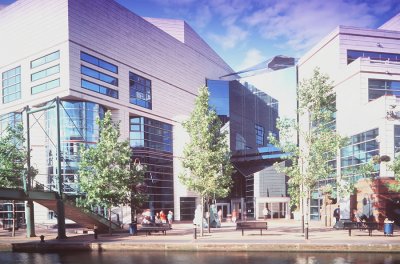
JISC Conference 2008
15 April 2008
International Convention Centre, Birmingham
http://www.jisc.ac.uk/events/2008/04/jiscconference08.aspx
JISC CNI 2008
10-11 July 2008
Belfast
http://www.jisc.ac.uk/events/2008/07/cniconference.aspx
IWMW 2008 Workshop
22-24 July 2008
University of Aberdeen
Further information will appear at: http://www.ukoln.ac.uk/web-focus/events/
Cataloguing and Indexing Group Annual Conference 2008
3-5 September 2008
Venue to be confirmed. Consult: http://www.ukoln.ac.uk/events/

The Digital Curation Centre (in which UKOLN is a partner) held the 3rd International Digital Curation Conference between 12-13 December 2007 at the Renaissance Hotel, Washington DC, USA. The Conference, entitled "Curating our Digital Scientific Heritage: a Global Collaborative Challenge", was held in partnership with the US National Science Foundation (NSF) and the Coalition for Networked Information (CNI). The first day focused on emerging strategy, collaboration and policy implementation and comprised keynote speakers and invited presentations, including national perspectives on curation from Europe, the UK, the USA and Australia, as well as a series of individual and domain-specific insights into curation issues. The second day was dedicated to research and featured peer-reviewed papers covering five major topic areas: interoperability and standards; migration and preservation strategies; preservation practices and challenges; partnerships, collaboration and trust; and metadata and representation information. The Conference proved to be a valuable opportunity for digital curation experts and practitioners from across the world to explore together the pressing issues in the field.
Further Information:
3rd International Digital Curation Conference
http://www.dcc.ac.uk/events/dcc-2007
Earlier this year the University of Bath joined forces with other large employers in the City to seek to reduce energy consumption by 10% over the next 3 years. In order to achieve this goal the Estates Department at the University has assigned a number of Energy Champions to manage energy usage in key University departments. The UKOLN System Administrator volunteered for this role and is working to help make UKOLN a cleaner and greener environment in which to work. We hope to promote other environmentally friendly initiatives such as smarter disposal of waste and increased use of recycled paper within offices. Initiatives so far have met with strong support from UKOLN staff, and further simple but effective measures are already in the pipeline.
In the first 4 months of the academic year, we have already seen a reduction in electricity consumption by the University in comparison with the same period last year. The overall energy consumption of the University has reduced from 9,173,200 kWh in November 2006 to 8,972,700 in November 2007. This equates to 2.19% reduction in energy usage so far this year. This is a great result, and shows that the Energy Champion approach is working, but is still off the 10% target that has been set. The Big Energy Challenge has put up a promotional Web site to help encourage further improvements, with an online questionnaire and training guide that will shortly go live.
At UKOLN all staff have shown an interest and are aware of the issues. We have managed to migrate material and rationalise server content thereby allowing us to take some older servers out of commission with attendant energy saving. We have recently purchased a new server on which to host virtual services, so combining services and saving on hardware energy usage. Although still experimental at the moment, this strategy should help reduce the amount of new equipment we will have to purchase in the future, meaning savings on materials and production processes as well as the electricity to power yet more hardware.
Given the amount of staff travel undertaken, we are also hoping to put into place a travel analysis for all staff. This will help us both to determine the carbon footprint from staff travel and to implement a further means of assessing our global impact in the digital library world. An article on these issues from the Systems perspective will appear in the Winter issue (54) of Ariadne.
Further Information:
Promoting and sustaining energy efficiency across the University and across
Bath:
http://www.bath.ac.uk/estates/energy/energysavingproject.shtml
The Big Energy Challenge:
http://www.bigenergychallenge.org/
University Carbon Management summary
http://www.bath.ac.uk/estates/energy/carbonsummary.shtml
University of Bath Department of Estates
Energy, environment & sustainability: what can I do?
http://www.bath.ac.uk/estates/energy/whatcanido.shtml
University of Bath Department of Estates
Energy, environment & sustainability
http://www.bath.ac.uk/estates/energy/
Digital Curation Centre (DCC) staff at UKOLN have completed a synthesis of JISC-funded research into digital preservation and asset management in institutions (termed the 4-04 Programme). The final report recognises the success of the programme in achieving its aim to support preservation and management of digital assets within institutions by developing a range of management and assessment tools, training programmes and preservation services for institutional repositories. It synthesises all of the tangible results and outputs of projects funded under the programme together in one location for ease of access and dissemination, providing a thematic overview of outputs and experiences at a programme level. The main themes addressed during the programme included standards, shared services, costs and business models, assessment and surveys, and life-cycle investigations. These were approached from several different perspectives, ranging from digital libraries to HE/FE institutions and institutional archives, and have explored in relation to a range of digital asset types commonly found in an institutional setting.
Further Information:
Synthesis study: Supporting Digital Preservation & Asset Management in Institutions
http://www.ukoln.ac.uk/ukoln/staff/m.pennock/publications/
This project will investigate the combination and comparison of controlled and folksonomy approaches to semantic interoperability supporting resource discovery in repositories and digital collections. This project will demonstrate and evaluate the combination of both approaches in the context of repositories and digital collections, attempting to get the best of both worlds.
UKOLN will be working in partnership with the University of Glamorgan, Intute (MIMAS at the University of Manchester), CCLRC and OCLC Office of Research on this 12-month project.
This study will analyse issues related to the potential delivery of a terminology registry as a shared infrastructure service within the JISC Information Environment. The study will consider how a registry might support development of terminology and other services within the context of a services-oriented environment. The study will draw on experience of the use and development of terminology and ontology registries in various domains, particularly within the e-learning and e-science domains, and will draw on experience from international initiatives.
The scoping study will make recommendations on which JISC can base decisions regarding future provision of a terminology registry. The work is funded for 6 months and UKOLN will be working with the University of Glamorgan and OCLC Office of Research.
Both projects are funded by JISC through the Repositories and Preservation Programme.
Further Information:
JISC Repositories and Preservation Programme
http://www.jisc.ac.uk/whatwedo/programmes/programme_rep_pres.aspx
UKOLN's Software and Systems team working with their Repositories Research Officer has implemented a Digital Repository for the JISC Information Environment Programme. The repository software that has been installed is the latest version of Eprints software (currently version 3). Although UKOLN does a lot of research-based work in digital repositories, setting up a repository has been an excellent way to understand some of the practical issues that are involved. The JISC IE repository is designed to promote the dissemination, sharing and storage of outputs from JISC repository, preservation and portals, and presentation programmes by providing open access to project deliverables and other relevant documents. You will be able to find final reports from projects, consultancy work etc in one place. The development of the repository supports JISC's ethos of open access to publicly funded projects and research.
Further Information:
The JISC Information environment:
http://www.jisc.ac.uk/whatwedo/themes/information_environment.aspx
The JISC Information Environment Repository:
http://ie-repository.jisc.ac.uk
Eprints Software:
http://www.eprints.org

The UK DCMI (Dublin Core Metadata Initiative) Affiliate which is coordinated by UKOLN, seeks to promote the use of DC metadata standards in the UK and feed back requirements to DCMI. The UK Web pages have been restructured the better to reflect current work, and will continue to be updated. UKOLN helped to organise a CETIS Metadata and Digital Repository Special Interest Group (MDR SIG) meeting in Manchester in April. The group is a forum for members to share experience of how relevant specifications and common practice can be used within the UK Higher and Further Education sectors. The April meeting focused on Dublin Core work. The day kicked off with an introduction to the Dublin Core Abstract Model, a framework for the construction of sets of resource descriptions. Other presentations included the ePrints DCMI Application Profile for describing scholarly works developed by UKOLN and Eduserv, the DC-Ed application profile being taken forward by the DCMI Education Community, and the Becta Vocabulary Management Services. The work of the UK DCMI Affiliate was introduced and there was some useful discussion about future work.
Further Information:
UK DCMI Affiliate Web pages:
http://www.ukoln.ac.uk/metadata/dcmi-affiliate/
CETIS MDR SIG wiki pages:
http://wiki.cetis.ac.uk/Metadata_and_Digital_Repository
The Repositories Research Team at UKOLN, on behalf of JISC, has established the JISC Common Repository Interfaces Working Group (CRIG). Members of this group include a range of experts in repository technical development and the UK repository landscape, many drawn from current JISC-funded projects addressing interoperability between repositories. The group is co-chaired by Les Carr (Eprints technical manager) and Jim Downing (DSpace developer, SPECTRa Project). CRIG members met informally at a Content Packaging experts' workshop organised by UKOLN and held their first meeting by teleconference on 29 March. Through this meeting it is hoped, by developing scenarios, to identify interfaces critical to the development of an interoperable network of repositories to serve the UK HE community. It was timely to establish this WG in order to focus requirements and experience from the JISC repository programmes to contribute to the recently announced Object Re-use and Exchange.
Further Information:
CRIG Web page:
http://www.ukoln.ac.uk/repositories/digirep/index/CRIG
During the early part of 2007, a Task Group including Ann Chapman and Rosemary Russell of UKOLN, worked on final revisions to the DC Collections AP. This was submitted for review at the March 2007 meeting of the Dublin Core Usage Board, which determined that the Profile conforms to review criteria (i.e. conforms with the DC Abstract Model, is internally consistent, and is documented according to guidelines) and is now finalising a formal review. Much of the work on the profile was carried out by Pete Johnston, now of Eduserv, while working at UKOLN. In addition to the Task Group, which was set up specifically to resolve outstanding issues and finalise the AP, a DCMI Collections Community now provides a forum for implementers of the Collections AP and for a broader discussion of issues related to collection description.
Further Information:
DCMI Collection Description Community
http://dublincore.org/groups/collections/
A new series of CIG seminars, held with the support of the UKOLN events team, has attracted good audiences. Blogging from the backroom (8 June 2007) was designed for those working in traditional 'backroom' roles such as cataloguing, acquisitions and knowledge management. Sessions covered blogging the catalogue and why cat & class skills translate easily into tagging and basic site navigation; raising your profile thorough blogging; blogging for managers; and how the National Library for Health and the Home Office are using blogs, feeds and related technologies. Participants received a CD-ROM of presentations and 'how-to' demonstrations. Moving the record (26 September 2007) focused on the benefits of moving to MARC 21 and issues about the process. With many attendees actively considering the move, this was a welcome chance to learn from the experience of others. CIG Standards Forum (26 September 2007) covered recent changes in MARC 21 formats and the Dewey Decimal Classification, together with a look at the progress on RDA, the successor to AACR. Due to demand, plans are in hand to repeat this event.
Further Information:
Blogging from the Backroom
http://www.ukoln.ac.uk/events/CIG/2007/
For the Library Trends themed issue looking at library and information provision and services for visually impaired people, Ann Chapman was commissioned to contribute a paper on the implications for cataloguing. Her article 'Resource discovery: catalogs, cataloging and the user' considers resource discovery from the viewpoint of visually impaired people. Starting with the tasks of find, identify, select and obtain, it examines how catalogues can be enhanced to assist visually impaired users. It then looks at the inclusion of specific data within catalogue records and how they help the user. This is followed by some reflections on display issues and a reference to the need for accessibility in catalogue systems. It concludes that improvements for visually impaired people provide features that sighted people will appreciate as well. Library Trends, issued quarterly, explores critical trends in professional librarianship, including practical applications, thorough analyses, and literature reviews.
Further Information:
Library Trends, Vol.55 (4) Spring 2007. pp 917-931.
http://findarticles.com/p/articles/mi_m1387/is_4_55

This year UKOLN's annual Institutional Web Management Workshop (IWMW 2007) was held at the University of York on 16-18 July. The theme of this year's event, the eleventh in the series, was "Next Steps for the Web Management Community" which provided an opportunity to explore not only use of social networking services for our user communities but also its potential to enhance the effectiveness of Web professionals within the sector. A feature of the event over recent years has been exploring ways in which technologies can be used to enhance the effectiveness of the event. This year was the first time in which all of the plenary talks were streamed live to a remote audience, with a video recording of the talks being made available shortly after the event. Another first this year was the Innovation Competition with submissions demonstrating lightweight, user-focused and 'cool' examples of innovation developed within the sector.

Further Information:
IWMW 2007 Web site:
http://www.ukoln.ac.uk/web-focus/events/workshops/webmaster-2007
IWMW 2007 Innovation Competition:
http://www.ukoln.ac.uk/web-focus/events/workshops/webmaster-2007/competition/
IWMW 2007: Video of Plenary Talks:
http://www.ukoln.ac.uk/web-focus/events/workshops/webmaster-2007/video/
How should institutions go about providing blogging services? And how should institutions respond to the opportunities provided by the popularity of social networks such as Facebook? These were the issues addressed at a workshop on "Exploiting the Potential of Blogs and Social Networks" held in Birmingham in November 2007. The event consisted of case studies from the Universities of Birmingham and Leeds which described the blogging services they have deployed, followed by a case study from Edge Hill University on how it is making use of social networking services. A valuable insight into the student perspective from the University of Bath described the potential benefits of Facebook together with details of the educational approaches which aim to address the privacy concerns many people have with such services. Other challenges in using externally provided services were described, which then led into discussion groups. Summaries of the events are available on the event wiki.
Further Information:
Exploiting the Potential of Blogs and Social Networks
http://www.ukoln.ac.uk/web-focus/events/workshops/blogs-social-networks-2007/
Exploiting the Potential of Blogs and Social Networks: Wiki
http://blog-social-networks-2007.wetpaint.com/
OAI-PMH, the protocol for metadata harvesting, has revolutionised the way in which repositories share metadata. Yet there is no similar mechanism for deposit into repositories, the crucial first stage in any repository data-flow. Under the September 2006 JISC call for funding, UKOLN was successful in securing funding for a short project to create a lightweight Web service for deposit. Known as SWORD (Simple Web service Offering Repository Deposit), the project is a partnership led by UKOLN, with the University of Southampton, Intrallect Ltd and the Centre for Advanced Software and Intelligent Systems (CASIS) at the University of Wales Aberystwyth. The project aims to take forward the work done by the Deposit API working group in 2006 by finalising the work on a deposit specification, implementing this in EPrints, Dspace, Fedora and IntraLibrary and developing a reference implementation as a proof of concept. Members of the project team are also represented on the OAI-ORE Technical and Liaison Committees and can thus ensure that this work is in line with international effort in this area
Further Information:
SWORD Project Web pages
http://www.ukoln.ac.uk/repositories/digirep/index/SWORD
Item on OAI-ORE from issue 18 front page
http://www.ukoln.ac.uk/focus/issue18/#18.6
UKOLN and the DCC are partners in the Repositories Support Project (RSP), a major initiative from JISC to support the development and growth of the repositories network in the UK. The RSP held its inaugural Summer School for prospective and new managers of institutional and subject repositories in the beautiful surroundings of Dartington Hall, Devon. We are delighted to report that the school was a resounding success, delivering a comprehensive overview of the practical challenges and solutions to effective repository implementation and establishing a close-knit community that will continue to receive support from the RSP over the forthcoming year. Feedback from the event has been excellent, with one delegate commenting 'I have learnt more from this single event than I have from 2 months of looking up IR sites', and another that 'if I don't know what to do [...in the future...], I know I've got support from RSP and participants at the event'. Presentations will be available from the RSP Web site. Plans for subsequent schools are already in the pipeline and will be announced in due course.
Further Information:
"Class of 2007: The Repositories Support Project Summer School" by
Jackie Knowles, July 2007, Ariadne, Issue 52.
http://www.ariadne.ac.uk/issue52/rsp-summer-sch-rpt/
The eBank-UK Project has constructed an institutional data repository (eCrystals) to make available the raw, derived and results data from a crystallographic experiment. Building on the concept of open access, the project has focused on the laboratory-based experimental technique of chemical crystallography undertaken at the UK National Crystallography Centre (NCS). Following the creation of a completed crystal structure determination, data is uploaded into eCrystals and supplemented with chemical and bibliographic metadata. As part of the work undertaken by the DCC in Phase 3 of the eBank UK Project, a study examining the issues relating to curation and preservation of crystallography data has been made available on the eBank project Web site. The study explores: audit and certification; OAIS and representation information; the eBank metadata application profile and preservation metadata; and the ePrints.org repository software. It also makes recommendations in each of these areas in relation to the further development of the eCrystals repository and proposed federation.
Further Information:
M. Patel and S. Coles, "A Study of Curation and Preservation issues in the eCrystals Data Repository and proposed federation", September 2007
http://www.ukoln.ac.uk/projects/ebank-uk/curation/
UKOLN has recently taken the lead on a concerted effort to aid and encourage the adoption of the Scholarly Works Application Profile (SWAP). This new application profile of Dublin Core (DC) has been jointly developed by UKOLN and Eduserv. The work is being carried out in the context of UKOLN's core-funded role as "managing agent" working on behalf of JISC and MLA as the UK Dublin Core Metadata Initiative (DCMI) Affiliate. The project is being managed by Rosemary Russell and is being contributed to by UKOLN staff. Currently, in the early planning stages, it is expected that the project will include aspects of technical development and negotiations with software developers, as well as significant community-building activity. SWAP uses as its core a Functional Requirements for Bibliographic Records (FRBR) based approach to modelling the complex metadata requirements needed to describe scholarly works which is much richer than simple DC. Consequently it can answer questions such as: What is the URL of the most appropriate copy (a FRBR item) of the PDF format (a manifestation) of the preprint version (a expression) for this eprint (the work)? and Are these two copies related? if so, how?
Further Information:
Eprints Application Profile - DigiRepWiki
http://www.ukoln.ac.uk/repositories/digirep/index/Eprints_Application_Profile
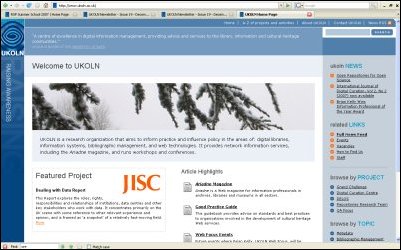
Over the past few months, work has been going on behind the scenes to revamp the UKOLN Web site. The aim of this work is to provide a Web site that will meet the demands of its users by improving delivery of information, by supporting interaction among stakeholders and by facilitating community building. The Web development project team's tasks included reviewing navigation by setting up user testing sessions, updating the UKOLN branding in consultation with Headscape, a Web design company specializing in this sector, and improving some of the technical issues without deleting or altering any URLs... and this on on a site that is now weighing in at 9.5Gb (and growing). With our policy of maintaining standards yet bringing in changes and improvements, it was vital that the planning of each element of this phase of the project were meticulous. We have painstakingly logged all the unexpected issues that have arisen as we implemented the changes - and, as is often the case, it was the job that appeared the simplest that threw up more issues, which, in turn, needed to be logged and resolved before moving on. Little by little, we solved the majority of issues that arose during this initial phase of re-development and we have now been able to launch around 100 pages of our Web site in the new style. There is, however, little time to catch our team breath, as we now have to scope and plan Phase 2, in which we will be taking a closer look at technical architecture. We will continue to update existing pages in areas that are current, and look to add more features over time to meet user demands. We do hope your experience of our Web site will be enhanced…..and would advise "watch this space".
Further Information:
UKOLN Web site:
http://www.ukoln.ac.uk/
Headscape Web site:
http://www.headscape.co.uk/
Resources for staff in the cultural and heritage sector (e.g. libraries, archives and museums) on core areas of expertise within UKOLN will shortly be available online via the UKOLN Web site. There are five main areas to be covered: Collections; Content Management and Repositories; Digital Preservation; Standards and Metadata; and Community Building and Social Networking. The resources will include overviews and practical tips plus more in-depth information. The initial resources, though useful in their own right, will also be used as a springboard for staff in the cultural and heritage sector to discuss with UKOLN about how they might tap into the areas of its expertise and apply them in their own projects. The aim is to build on the existing body of successful collaborative work between UKOLN and the cultural heritage sector. Making new resources available to these practitioners on a regular basis is part of this ongoing conversation.
Thanks to a broad, interdisciplinary international research community, social tagging research has grown into an area with a strong basis in theory. Several clearly-defined research aims and areas of interest have developed through previous years. The recent NKOS Workshop, held at ECDL 2007 in Budapest this September, provided an opportunity to examine some of this work in the wider context of research in the area of terminology and knowledge organisation. Although researchers in the area come from many disciplines, the mixture has led to lively discussion and many opportunities for collaboration, nationally and internationally.
Today, themes of interest include, amongst many others, the following: the possibility of mapping tags either to constrained vocabularies or to category sets in general; tag analysis and understanding of tagging behaviour and the types of tags used; models of language use and their relation both to tagging behaviour and to ‘reading’ of the tags; and the open question of the extent to which knowledge gained about practices in social tagging may feed back into our understanding of human-contributed metadata. Research into social tagging has had the interesting effect that it has led many researchers to re-examine accepted wisdom regarding metadata authorship and use in resource discovery, to engage with literature from many disciplines and to consider links between document surrogates such as tags or metadata records and indexing algorithms and machine-driven methods of analysis applied in the process of document retrieval.
Further Information:
The 6th European Networked Knowledge Organization Systems (NKOS) Workshop
at the 11th ECDL Conference, Budapest, Hungary
21 September 2007
http://www.comp.glam.ac.uk/pages/research/hypermedia/nkos/nkos2007/programme.html
The DCMI Social Tagging Community, moderated by Liddy Nevile, is now over a year old. In that time, discussions have taken place on a JISCmail email list; due to a successful call for participation composed by Ana Alice Baptista of the University of Minho, research into the links between Dublin Core metadata and social tagging in use took place during that year, and initial findings reported at the 2007 NKOS workshop held at this year's ECDL in Budapest. Further work between European participants is now being coordinated by Emma Tonkin.
On a related note, a group of researchers – mostly North American – attending ASIS&T 2006 formed the then-unofficial 'SIG-TAG' special interest group in social tagging. Ongoing contact between these researchers led to a successful panel proposal for this year's ASIS&T annual meeting, as a result of which the SIG-TAG is now expected to move from an informal group to a Virtual SIG.
Better communication on local, national and international levels is beneficial for researchers and funding agencies alike, and indirectly for the user communities as well, who benefit from shared case studies and improved understanding of the field of study.
Further Information:
DCMI Social Tagging Community:
http://dublincore.org/groups/social-tagging/
sigtag-l Information page:
http://mail.asis.org/mailman/listinfo/sigtag-l

The International Journal of Digital Curation, published by the Digital Curation Centre and produced by UKOLN at the University of Bath, has published Volume 2 Issue 2 just prior to the 3rd International Digital Curation Conference which took place recently in Washington, DC. The Journal offers a combination of peer-reviewed papers and general articles offering valuable insights into the research challenges, service developments, best practice and policy approaches associated with digital curation. In this most recent issue, peer-reviewed papers offered perspectives on scientific data, textual data and on education. There was also a range of reports and articles from projects and meetings as well as an article entitled Emulation for Digital Preservation in Practice: The Results and another contribution on the challenges currently facing the DCC’s new eScience Liaison initiative.
Further Information:
International Journal of Digital Curation
http://www.ijdc.net/
In January we welcomed Arte Cropper to UKOLN, as the Events and Marketing Manager, whilst Natasha Bishop was away on maternity leave, and we congratulate Natasha on the birth of her son, in February. Congratulations also to Marieke Guy and Maureen Pennock on the birth of their babies (boys also) during the summer.
Pete Cliff and Stephanie Taylor joined us in April to work on the JISC-funded Repositories Support Project. Pete and Stephanie will be providing technical guidance and advice to Higher Education institutions setting up their own repositories. For Pete, this is a welcome return, as he worked for UKOLN from 2000 to 2003 as a systems developer - with particular involvement in the development of the Resource Discovery Network - now known as Intute. During 2007 we also welcomed Colin Neilson, to work on the SCARP Project, Mark Dewey, as Web Systems Developer, and Kora Golub, to work in the R&D Team.
Staff moving on from UKOLN this year included Traugott Koch. Greg Tourte, Julie Allinson and Matt Thrower. And after more than 10 years at UKOLN, Rachel Heery retired in October. See the feature article on Rachel's career with UKOLN.
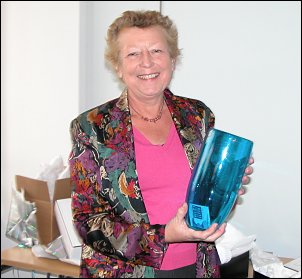
Further Information:
UKOLN Staff Pages
http://www.ukoln.ac.uk/ukoln/staff/
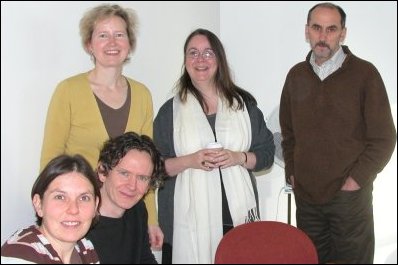
At the end of November UKOLN held a one-day workshop for colleagues who operate remotely from its offices on the University of Bath campus. The workshop, organised by Bridget Robinson and the UKOLN Resources and Administration Team was facilitated by Sylvia Vacher of Objectives Training and Development. Marieke Guy, Adrian Stevenson, Rosemary Russell, Stephanie Taylor, Colin Neilson (pictured above) and Monica Duke worked together to discuss and develop strategies for improving personal and collaborative working practices in their particular distributed environment.
New readers may not be aware that Ariadne is published by UKOLN and its autumn issue (no. 53) has a trio of articles on European-based projects DRIVER, the Video Active Portal (which offers access to television heritage material from leading archives across Europe) and reflections on four years of progress in the DARE Programme. Sophia Ananiadou, Director of the National Centre for Text Mining looks at NaCTeM's main scientific challenges and how the Centre is addressing them. The issue also offers discussion of plans for the engagement with born digital archival material at the Wellcome Library, an overview of studies investigating how the Second Life environment is being used in UK Higher and Further Education and an examination of Google as a repository within the wider context of resource management and provision in Further and Higher Education together with event reports and reviews.
The upcoming winter issue will, among other articles, offer a view of e-publication and open access in the Arts and Humanities in the UK, a Systems perspective on saving energy in the workplace, a discussion of tagging of documents in the context of social networks and a report on moves on preservation and dissemination of South American indigenous intangible heritage using Web-based tools.
Further Information:
Ariadne Web Magazine
http://www.ariadne.ac.uk/